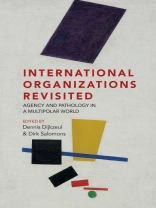Despite the sustained scholarly attention that the United Nations and international NGOs have received in the twenty-first century, they still remain under-researched from a management studies perspective. This volume brings together rich analyses of these organizations’ functioning, arguing that they are best understood as intermediaries between international decision-making and funding bodies in the developed world and initiatives that take place on the ground, primarily in the Global South. Based on current management research, this follow-up to Rethinking International Organizations (Berghahn, 2002) provides a wealth of both empirical and theoretical insights, along with practical recommendations how these organizations can function more effectively.
表中的内容
List of Illustrations
Preface
List of Abbreviations
Introduction: International Organizations Revisited
Dennis Dijkzeul and Dirk Salomons
Part I: Decision-Making with National Governments
Chapter 1. Multilateral Diplomacy, Global Governance and Networks of Inter-Governmental and Non-Governmental Organizations
James P. Muldoon, Jr. and Jo Ann B. Aviel
Chapter 2. Financing as the UN’s Chronic Deficiency
Sandra Aviles and Romano Lasker
Chapter 3. Norm Setting at the United Nations: The Politics of Sustainable Human Development
Jacques Fomerand
Part II: Decision-Making within International Organizations
Chapter 4. Managing People at the United Nations: Squaring the Circle of Merit and Patronage
Dirk Salomons
Chapter 5. Fraud, Corruption and the United Nations’ Culture
Yves Beigbeder
Part III: Implementation and Evaluation
Chapter 6. The Program Approach and Its Lack of Participation
Dennis Dijkzeul
Chapter 7. How NGO Practices Mediate International Human Rights
Monika Krause
Chapter 8. Networked Diplomacy and Changing Polarity in World Politics: An Armenia-Turkey Normalization Attempt
Anna Ohanyan and Gevorg Ter-Gabrielyan
Chapter 9. The Use and Limits of Civil Society for Post-Conflict State Democratization: Donor Practices in Bosnia and Herzegovina Revisited
Kristie D. Evenson
Chapter 10. UN Security Council Resolution 1325 in Afghanistan: Opportunity or Rhetorical Device?
Lucile Martin and Saeed Parto
Part IV: Conclusions
Chapter 11. Therapies and Conclusions: Toward A Better Understanding of the Management of International Organizations
Dennis Dijkzeul, Yves Beigbeder and Dirk Salomons
Index
关于作者
Dirk Salomons is a Special Lecturer in humanitarian policy at Columbia University’s School of International and Public Affairs. From 2002 to 2015, he directed SIPA’s Humanitarian Policy Track and its International Organizations Specialization. After many years at the United Nations, he became Managing Partner at the Praxis Group, an international consulting firm, which he led from 1997 until 2012.












